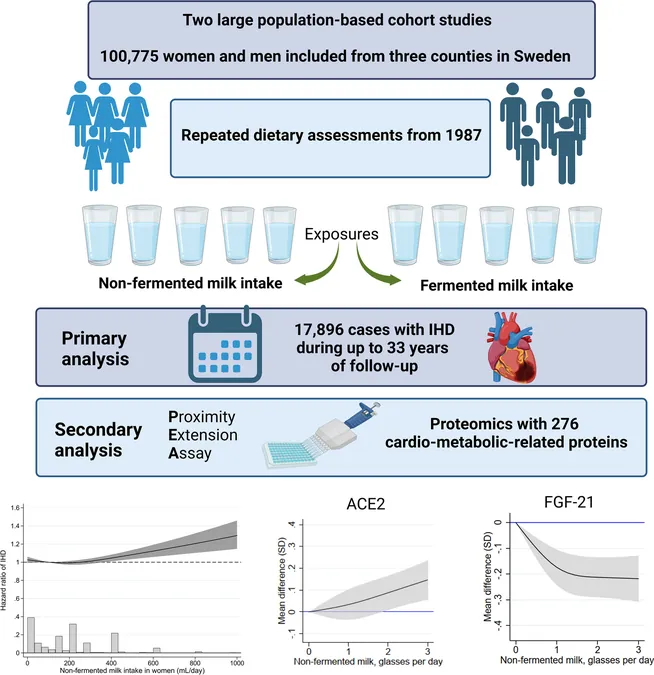
New Research Links Milk Consumption to Heart Disease Risks in Swedish Men and Women!
2024-11-08
Author: Jacques
Recent findings from two extensive cohort studies in Sweden, involving over 100,000 participants, have highlighted the potential impact of milk consumption on ischemic heart disease (IHD) risk among both genders.
The studies, part of the Swedish Mammography Cohort (SMC) and the Cohort of Swedish Men (COSM), tracked the dietary habits of participants over several decades.
Comprehensive Study Methodology
The SMC enlisted women born between 1914 and 1948, while COSM focused on men born between 1918 and 1952, creating a diverse pool of nearly 200,000 individuals.
Through a series of detailed questionnaires, researchers collected data on dietary intake, lifestyle factors, and medical history.
After excluding participants with prior heart disease or cancer, the study narrowed down to 59,988 women and 40,777 men for analysis.
Milk Intake and Ischemic Heart Disease
Participants reported their consumption of various dairy products, including non-fermented milk (categorized by fat content) and fermented milk such as yogurt.
The findings revealed that non-fermented milk intake was positively associated with a higher risk of IHD in women, particularly when consumed in quantities exceeding 300 mL per day.
Notably, for women consuming 600 mL per day, the hazard ratio indicated a significant increase in IHD risk.
However, the study showed mixed results for men, as non-fermented milk consumption did not correspond to an increased IHD risk.
Surprisingly, fermented milk did not demonstrate any significant protective effect against heart disease for either sex.
Key Factors and Proteomics Insights
The analysis also delved into the relationship between milk consumption and cardiometabolic proteins in plasma.
Two proteins, angiotensin-converting enzyme 2 (ACE2) and fibroblast growth factor 21 (FGF21), were notably affected by non-fermented milk intake; while higher ACE2 levels correlated with increased IHD risk among women, elevated FGF21 levels were linked to adverse cardiometabolic outcomes.
Substitution Analysis Suggests Healthier Choices
An interesting substitution analysis suggested that replacing non-fermented milk with fermented milk might lower IHD risks—further encouraging dietary modifications for heart health.
Women exhibited a hazard ratio reduction of 0.95 for IHD when this substitution was made.
Implications of Research Findings
This groundbreaking research contributes to a nuanced understanding of how dairy consumption impacts heart health, particularly among different genders.
As milk intake can vary greatly across populations, these results raise important questions about dietary recommendations, encouraging further investigations into the specific types of milk and their broader health implications.
Final Takeaway
Overall, this research underscores the critical need to scrutinize dietary habits regarding heart disease risk, advocating for tailored nutritional advice that considers both gender differences and the varied effects of milk consumption on health.
As we consume our favorite dairy products, it's essential to be informed about the potential risks and consider moderation and balance in our diets.
Stay tuned for more updates on health and nutrition!









 Brasil (PT)
Brasil (PT)
 Canada (EN)
Canada (EN)
 Chile (ES)
Chile (ES)
 España (ES)
España (ES)
 France (FR)
France (FR)
 Hong Kong (EN)
Hong Kong (EN)
 Italia (IT)
Italia (IT)
 日本 (JA)
日本 (JA)
 Magyarország (HU)
Magyarország (HU)
 Norge (NO)
Norge (NO)
 Polska (PL)
Polska (PL)
 Schweiz (DE)
Schweiz (DE)
 Singapore (EN)
Singapore (EN)
 Sverige (SV)
Sverige (SV)
 Suomi (FI)
Suomi (FI)
 Türkiye (TR)
Türkiye (TR)